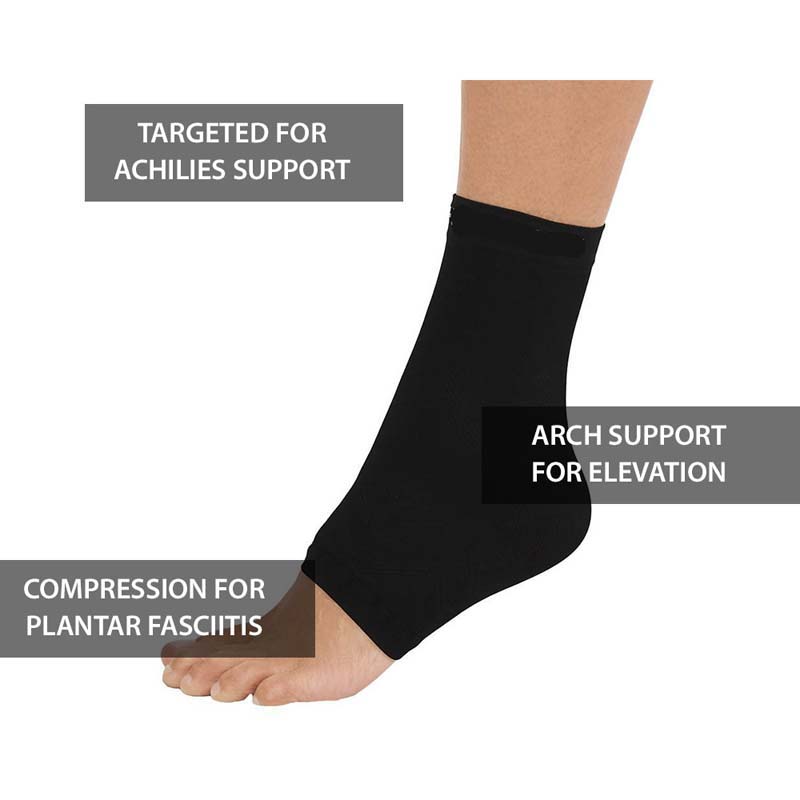Plantar Fasciitis: When to Seek Professional Help

Featured Products for Plantar Fasciitis Foot Pain Relief
Plantar fasciitis, characterized by heel pain caused by inflammation of the plantar fascia, can be a persistent and discomforting condition. While there are various self-care measures and lifestyle changes that can help manage symptoms, there are instances when seeking professional help becomes crucial. In this blog post, well discuss the signs and circumstances that indicate its time to consult with healthcare professionals for effective diagnosis and targeted treatment of plantar fasciitis.
Common Signs of Plantar Fasciitis:
-
Persistent Heel Pain:
- If you experience persistent pain in the heel, especially during the first steps in the morning or after periods of inactivity, it could be indicative of plantar fasciitis.
-
Increased Pain with Activity:
- Pain that intensifies during activities such as walking, running, or standing for prolonged periods may suggest plantar fasciitis.
-
Tightness or Stiffness:
- Sensations of tightness or stiffness in the bottom of the foot, particularly around the heel and arch, are common symptoms of plantar fasciitis.
-
Discomfort While Climbing Stairs:
- If you experience pain or discomfort while climbing stairs, it may be associated with plantar fasciitis.
-
Tenderness in the Heel:
- Tenderness or soreness when touching the heel or the bottom of the foot is a characteristic sign of plantar fasciitis.
When to Seek Professional Help:
-
Persistent Symptoms:
- If your plantar fasciitis symptoms persist despite trying home remedies and lifestyle modifications, its advisable to seek professional help.
-
Severe Pain or Swelling:
- Severe pain, swelling, or bruising in the heel may indicate a more advanced or potentially serious condition. Immediate medical attention is warranted in such cases.
-
Difficulty Walking:
- If you find it increasingly challenging to walk or if the pain significantly impairs your mobility, consult with a healthcare professional promptly.
-
Symptoms in Both Feet:
- If you experience symptoms in both feet simultaneously, it may indicate underlying factors that require professional evaluation.
-
Signs of Infection:
- Any signs of infection, such as redness, warmth, or the presence of pus around the affected area, necessitate immediate medical attention.
-
Numbness or Tingling:
- If you experience numbness or tingling in addition to heel pain, it could be indicative of nerve involvement, and a healthcare professional can assess the situation.
-
Diabetes or Other Health Conditions:
- Individuals with diabetes or other underlying health conditions should seek professional help promptly, as they may be at a higher risk of complications associated with plantar fasciitis.
Professional Help for Plantar Fasciitis:
-
Podiatrist or Orthopedic Specialist:
- A podiatrist or orthopedic specialist specializes in foot and ankle conditions. They can provide a comprehensive examination, diagnose plantar fasciitis, and recommend appropriate treatments.
-
Physical Therapist:
- Physical therapists can design specific exercises and stretching routines to alleviate plantar fasciitis symptoms. They may also address biomechanical factors contributing to the condition.
-
Pain Management Specialist:
- If the pain is severe and challenging to manage, a pain management specialist can offer interventions such as corticosteroid injections for short-term relief.
-
Orthopedic Surgeon:
- In rare cases where conservative treatments are ineffective, an orthopedic surgeon may explore surgical options to address plantar fasciitis, such as plantar fascia release.
What to Expect During a Professional Consultation:
-
Medical History and Examination:
- The healthcare professional will take a detailed medical history and conduct a physical examination to understand your symptoms and assess the condition of your feet.
-
Imaging Studies:
- In some cases, imaging studies such as X-rays or ultrasound may be recommended to provide a detailed view of the foot structure and identify any abnormalities.
-
Treatment Plan:
- Based on the diagnosis, the healthcare professional will develop a tailored treatment plan. This may include a combination of lifestyle modifications, physical therapy, orthotics, medications, and, in some cases, surgical intervention.
Conclusion:
Seeking professional help for plantar fasciitis is crucial when symptoms persist, worsen, or become increasingly debilitating. Healthcare professionals have the expertise to accurately diagnose the condition and provide targeted treatments to alleviate pain and promote healing. Early intervention can prevent the progression of plantar fasciitis and improve the likelihood of successful management. If you are experiencing persistent heel pain or related symptoms, schedule a consultation with a healthcare professional to receive personalized care and guidance.
Featured Products for Plantar Fasciitis Foot Pain Relief
Latest Blogs
- Taking a Stand Against Heel Pain: Practical Solutions
- Happy Heels, Happy Life: Banishing Foot Pain for Good
- The Road to Relief: Strategies for Combating Heel Pain
- Heel to Toe Wellness: Tackling Foot Pain Head-On
- Foot Pain Decoded: Understanding the Signals Your Feet Send
- Soothing Steps: Natural Remedies for Heel and Foot Pain
- Putting Your Best Foot Forward: Managing Heel Discomfort
- The ABCs of Happy Feet: Beating Heel and Foot Pain
- From Heel to Toe: Navigating Common Foot Pain Issues
- Taking a Step Back: Causes and Remedies for Heel Pain
- Footloose and Pain-Free: Tips for Happy Heels and Feet
- Soleful Solutions: A Guide to Alleviating Heel and Foot Discomfort
- Stepping Into Comfort: Understanding Heel and Foot Pain
- From Pain to Progress: Inspiring Plantar Fasciitis Journeys
- Living a Full Life with Plantar Fasciitis: Success Stories
- Plantar Fasciitis and Exercise: Finding the Right Balance
- The Impact of Stress on Plantar Fasciitis Symptoms
- Plantar Fasciitis: When to Seek Professional Help
- Inflammatory Foods and Plantar Fasciitis: What to Avoid
- Ergonomics and Plantar Fasciitis: A Comprehensive Guide
- The Importance of Rest in Plantar Fasciitis Recovery
- Traveling with Plantar Fasciitis: Tips for Happy Feet
- Plantar Fasciitis and Your Sleep: Improving Rest Quality
- The Psychological Aspect of Living with Plantar Fasciitis
- Plantar Fasciitis and High-Impact Activities: Navigating Risks
- How to Stay Active with Plantar Fasciitis: Practical Tips
- Plantar Fasciitis and Aging: Strategies for Seniors
- Cryotherapy for Plantar Fasciitis: Icy Relief for Your Feet
- Aquatic Exercise for Plantar Fasciitis: Dive into Healing
- Mindfulness and Meditation for Plantar Fasciitis Relief
- Heel Pain 101: A Guide to Plantar Fasciitis
- Finding Relief - Plantar Fasciitis Home Remedies
- The Emotional Toll of Chronic Plantar Fasciitis
- Post-Workout Foot Care for Plantar Fasciitis Sufferers
- DIY Foot Massage Techniques for Plantar Fasciitis
- From Diagnosis to Recoveryc- Navigating Plantar Fasciitis
- Plantar Fasciitis in Children Signs and Solutions
- Plantar Fasciitis and Weight: Impact on Foot Health
- How Nutrition Affects Plantar Fasciitis Recovery
- Yoga for Plantar Fasciitis: Poses for Pain Relief
- Breaking Down Plantar Fasciitis Myths and Misconceptions
- Plantar Fasciitis Stretches - Daily Routine for Relief
- The Link Between Plantar Fasciitis and Flat Feet
- Plantar Fasciitis in Pregnancy - What to Expect
- Desk Job Dilemma - Coping with Plantar Fasciitis at Work
- Plantar Fasciitis in Athletes Strategies for Recovery
- Massage and Plantar Fasciitis A Soothing Combination
- Plantar Fasciitis at Night: Tips for Better Sleep
- Plantar Fasciitis vs Heel Spurs - Understanding the Difference
- The Role of Stretching in Plantar Fasciitis Recovery
- Running with Plantar Fasciitis: Dos and Donts
- Preventing Plantar Fasciitis: Tips for Foot Health
- Natural Remedies for Plantar Fasciitis You Havent Tried
- Heel Pain Demystified: Plantar Fasciitis Explained
- Best Shoes for Plantar Fasciitis: A Comprehensive Guide
- Managing Plantar Fasciitis Pain: Tips and Tricks
- The Complete Guide to Plantar Fasciitis Treatment Options
- 10 Effective Exercises for Plantar Fasciitis Relief at Home
- Understanding Plantar Fasciitis: Causes and Symptoms
- Why do I get Pain in My Feet at Night
- Is pain in your feet a sign of diabetes
- What causes pain in my feet
- Plantar Fasciitis - Why so Painful
- What is that pain in my heel
- Should I Walk with Foot Pain
- How to Treat Ankle Pain
- 10 Best Exercises of Plantar Fasciitis
- Do Compression Socks Help Foot Pain
- Do Insoles Work for Foot Pain
- Best Stretches for Plantar Fasciitis
- 5 Causes of Plantar Fasciitis
- Do Back Posture Braces Actually Work
- Foot pain from walking
- Best Insoles for Plantar Fasciitis
- Pain in heel of foot after Running
- Treatment for Pain in arch of foot
- Pain on top of foot
- Mortons neuroma treatment
- How to remove an Ingrown Toenail
- Foot Heel Spur Pain
- Sore Foot in the Morning
- Suffer Heel Pain in the Morning ?
- Start a running routine
- Running through Fatigue
- Best Achilles Tendonitis and Ankle Excercises
- Causes of Achilles Tendonitis and Ankle Pain
- Plantar Fasciitis Cure and Treatment
- Best Plantar Fasciitis Products
- Causes of Plantar Fasciitis and Heel Spur Pain
- Best Plantar Fasciitis Excercises



















